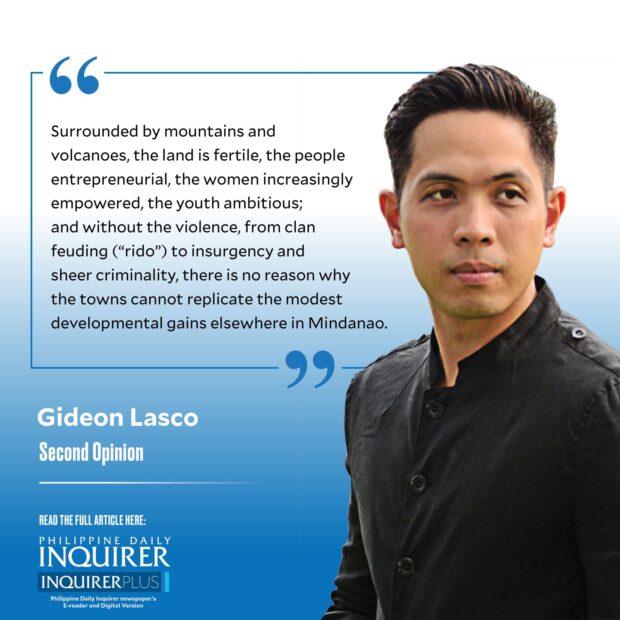Peace and friendship in Lanao del Sur
Marawi City—I am spending the night here in the main campus of Mindanao State University (MSU) after a three-day trip to Mount Makaturing, a densely forested, almost 2,000-meter active volcano, in Butig, the town widely considered to be the cradle of Meranaw culture.
The whole trip was a logistical challenge, but as a sign of the times, we were warmly welcomed in the Moro Islamic Liberation Front satellite camp in Butig, and were told with great confidence that “it is very safe” to climb the mountain. Our team leader Rodgen Rosco, club president of the Marawi-based MSU Mountaineering Club Inc., said that the Butig local government unit also enthusiastically approved our hike. Further facilitating our trip was the presence and participation of two young Maranao hikers, Osama Adiong and Abdulhaq Macabuat; Sam and Haq not only joined our sojourn but also introduced us to their culture.
Arriving in Marawi, of course, was already insightful in itself. Tarpaulins celebrating successful licensure examinations, university graduations, government promotions, and Hajj homecomings dominate the streets. Closer to Marawi itself, as the shared van ascended to the city’s elevation of around 700 meters above sea level, mosques and minarets point to the sky, with the “torogan” (traditional royal house) increasingly rare but nonetheless influencing some of the city’s architecture.
The 2017 “Battle of Marawi,” simply known here as the “siege,” still occupies a singular place in people’s narratives, and conversations would typically feature anecdotes about it, from a wayward missile that destroyed a gym to wayward soldiers that fought to the death over cash found in one house. When I asked about the “IS” signs painted in some walls, I am told that the Maute group’s message of Islamic liberation initially resonated with some sectors, including the youth, especially with the promised economic opportunities. The military response was an “overkill,” the consensus goes, but interestingly, some also speak of “good things” that came out of it, including the possibility of rebuilding a better Marawi.
In Ground Zero, the eerie silences, the stories retold, the very sight of gun-riddled ruins, are a grim reminder of the proximity and reality of violence and war within our archipelago.
And yet, I have sense that Lanao del Sur—which I first visited in 2013 to climb the fabled Mount Ragang—is experiencing a moment of measured optimism. Surrounded by mountains and volcanoes, the land is fertile, the people entrepreneurial, the women increasingly empowered, the youth ambitious; and without the violence, from clan feuding (“rido”) to insurgency and sheer criminality, there is no reason why the towns cannot replicate the modest developmental gains elsewhere in Mindanao.
But the violence itself is rooted in economic conditions in one of the country’s poorest provinces. Many communities are still deprived of stable electricity and infrastructure; access to education, health care, employment, and land are tenuous for the majority of the people, despite their industriousness. Unless these structural constraints are addressed, extremist groups like the nascent Dawlah Islamiyah will continue to recruit new members, and peace will remain at best fragile.
Equally important is the cultural, and not just political, inclusiveness, that autonomy can lead to but does not guarantee. The people we met in Butig we ambled with our backpacks—including a “kulintang” expert on horseback—spoke of great pride about their history, their lineage, and their ancestors; they were eager to connect and engage with us. But unless the Maranaos feel genuinely included in our imagined community; unless their proud heritage and rich cultural (including Islamic) traditions are reflected in our collective history and our identity, the allure of separatism will linger, like an active volcano that can erupt anytime. What’s at stake in the Bangsamoro Autonomous Region in Muslim Mindanao (BARMM) agreement, indeed, is the possibility of plurireligious, pluricultural nationhood, and we cannot afford to miss this historic opportunity.
Rosco, our team leader, believes that ecotourism can play a role in bridging economic and cultural divides, echoing the hopes of BARMM officials. Our trip seemed to offer some proof: After two days of traveling and hiking together, by the time we had camped around 1,300 meters above sea level, we were no longer Tagalog, Cebuano, Maranao; but a team of hikers sharing the same love for adventure; exploring the same beautiful land.
I do not have any illusions about the long road ahead—as my colleague Rufa Cagoco-Guiam has poignantly and often painfully illustrated in her columns on Marawi. But as I stood at the summit of Mount Makaturing, with a view of majestic Lake Lanao and the Bangsamoro heartland, my hope was renewed not just for the prospects of peace and development, but, Inshallah, of solidarity and friendship.
—————-
glasco@inquirer.com.ph

















